Analysis of Barriers Impeding Evidence-Based Practice in Nursing
VerifiedAdded on 2023/04/03
|12
|3081
|273
Literature Review
AI Summary
This literature review examines the barriers that hinder the implementation of evidence-based practice (EBP) in nursing. It synthesizes findings from multiple studies, highlighting factors such as lack of English proficiency, insufficient knowledge of EBP, heavy workloads, limited access to resources, and organizational constraints. The review also addresses the influence of healthcare professionals' beliefs and the reliance on traditional practices over research findings. Studies included employ various methodologies, including participatory action research, cross-sectional surveys, and qualitative interviews, to identify both human and organizational impediments. The review concludes by emphasizing the need for educational opportunities, stakeholder involvement, and resource allocation to facilitate the adoption of EBP, ultimately aiming to improve the quality of care and patient outcomes. Desklib offers this document along with a wealth of resources, including past papers and solved assignments, to support students in their academic endeavors.
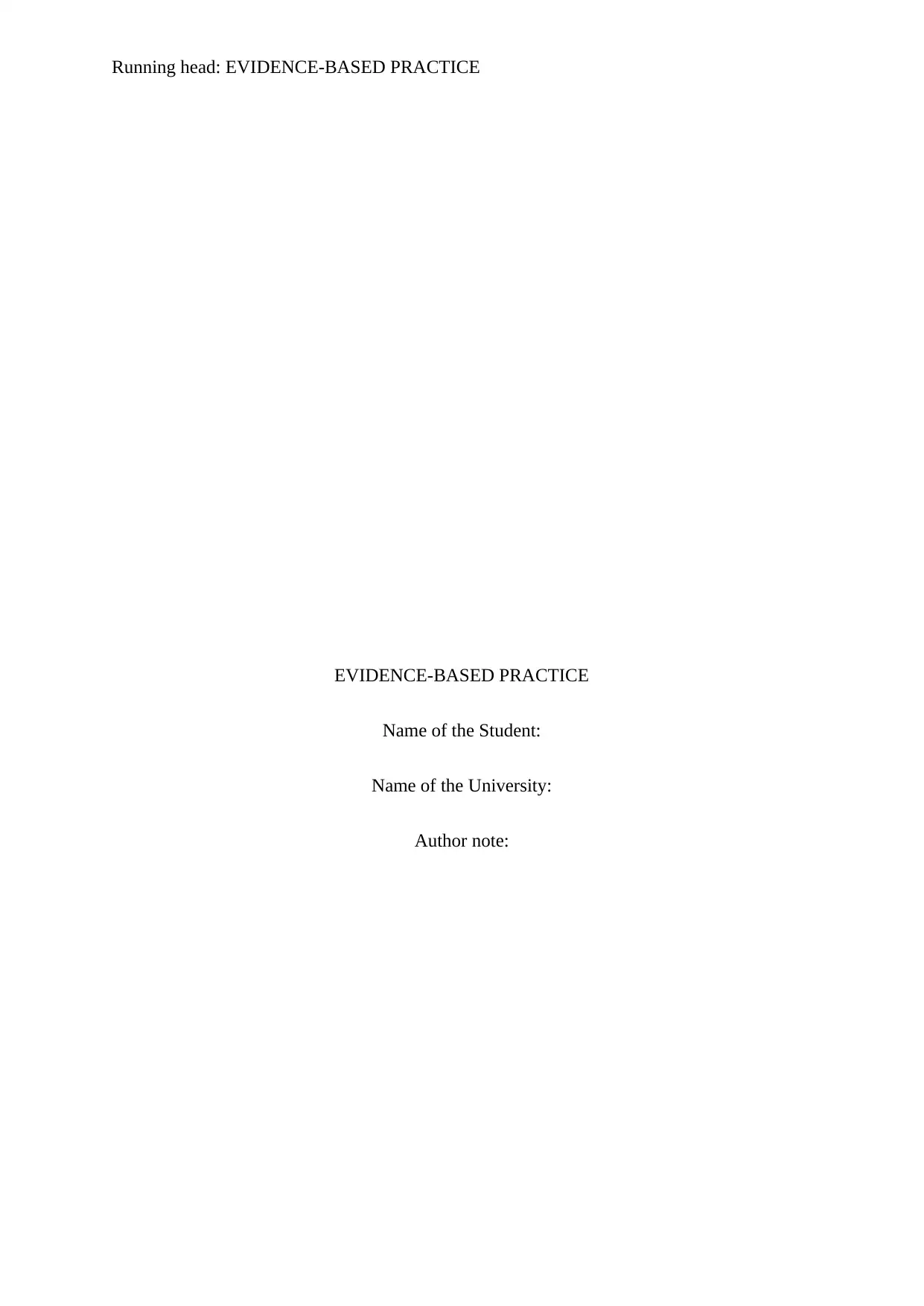
Running head: EVIDENCE-BASED PRACTICE
EVIDENCE-BASED PRACTICE
Name of the Student:
Name of the University:
Author note:
EVIDENCE-BASED PRACTICE
Name of the Student:
Name of the University:
Author note:
Paraphrase This Document
Need a fresh take? Get an instant paraphrase of this document with our AI Paraphraser
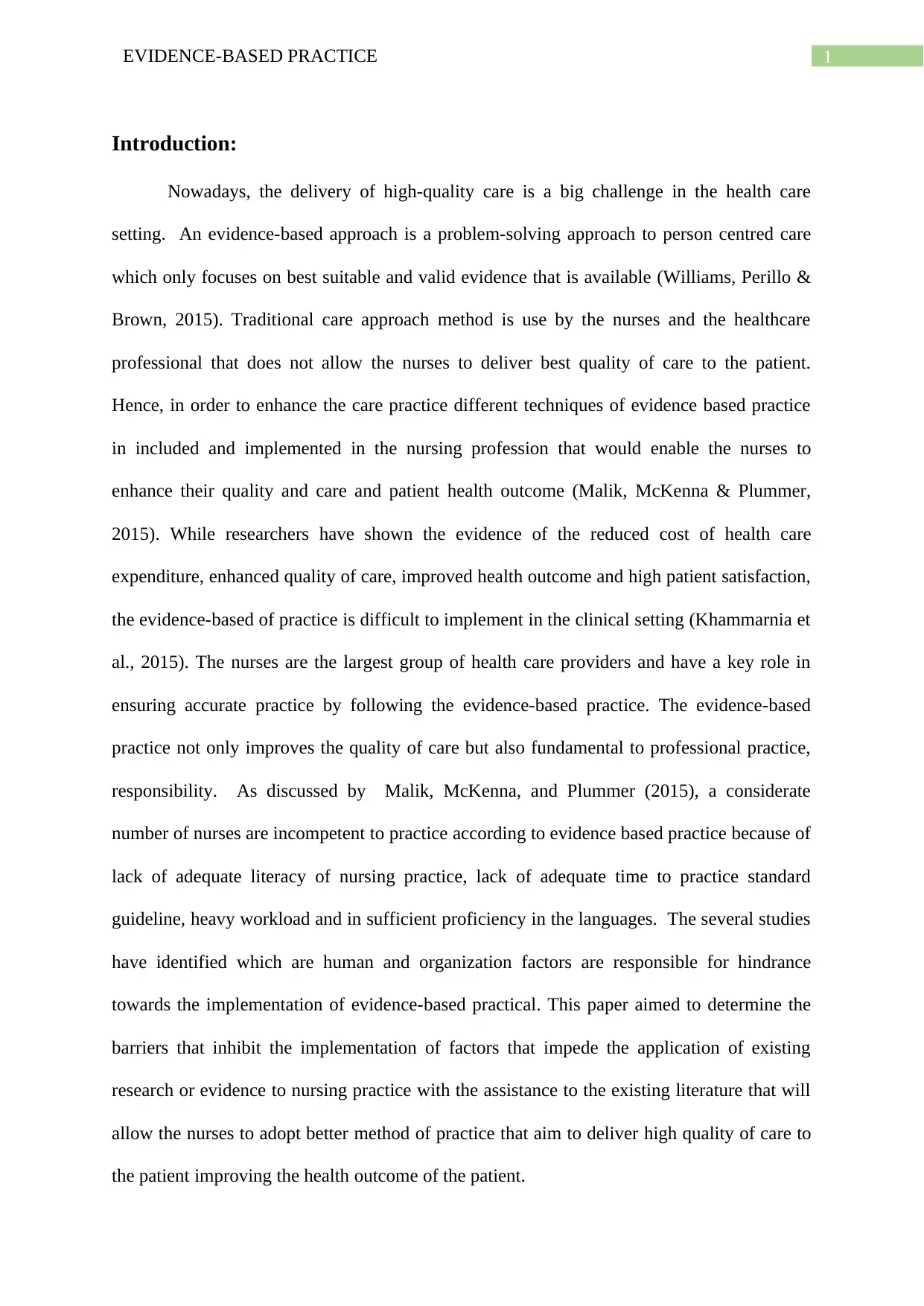
1EVIDENCE-BASED PRACTICE
Introduction:
Nowadays, the delivery of high-quality care is a big challenge in the health care
setting. An evidence-based approach is a problem-solving approach to person centred care
which only focuses on best suitable and valid evidence that is available (Williams, Perillo &
Brown, 2015). Traditional care approach method is use by the nurses and the healthcare
professional that does not allow the nurses to deliver best quality of care to the patient.
Hence, in order to enhance the care practice different techniques of evidence based practice
in included and implemented in the nursing profession that would enable the nurses to
enhance their quality and care and patient health outcome (Malik, McKenna & Plummer,
2015). While researchers have shown the evidence of the reduced cost of health care
expenditure, enhanced quality of care, improved health outcome and high patient satisfaction,
the evidence-based of practice is difficult to implement in the clinical setting (Khammarnia et
al., 2015). The nurses are the largest group of health care providers and have a key role in
ensuring accurate practice by following the evidence-based practice. The evidence-based
practice not only improves the quality of care but also fundamental to professional practice,
responsibility. As discussed by Malik, McKenna, and Plummer (2015), a considerate
number of nurses are incompetent to practice according to evidence based practice because of
lack of adequate literacy of nursing practice, lack of adequate time to practice standard
guideline, heavy workload and in sufficient proficiency in the languages. The several studies
have identified which are human and organization factors are responsible for hindrance
towards the implementation of evidence-based practical. This paper aimed to determine the
barriers that inhibit the implementation of factors that impede the application of existing
research or evidence to nursing practice with the assistance to the existing literature that will
allow the nurses to adopt better method of practice that aim to deliver high quality of care to
the patient improving the health outcome of the patient.
Introduction:
Nowadays, the delivery of high-quality care is a big challenge in the health care
setting. An evidence-based approach is a problem-solving approach to person centred care
which only focuses on best suitable and valid evidence that is available (Williams, Perillo &
Brown, 2015). Traditional care approach method is use by the nurses and the healthcare
professional that does not allow the nurses to deliver best quality of care to the patient.
Hence, in order to enhance the care practice different techniques of evidence based practice
in included and implemented in the nursing profession that would enable the nurses to
enhance their quality and care and patient health outcome (Malik, McKenna & Plummer,
2015). While researchers have shown the evidence of the reduced cost of health care
expenditure, enhanced quality of care, improved health outcome and high patient satisfaction,
the evidence-based of practice is difficult to implement in the clinical setting (Khammarnia et
al., 2015). The nurses are the largest group of health care providers and have a key role in
ensuring accurate practice by following the evidence-based practice. The evidence-based
practice not only improves the quality of care but also fundamental to professional practice,
responsibility. As discussed by Malik, McKenna, and Plummer (2015), a considerate
number of nurses are incompetent to practice according to evidence based practice because of
lack of adequate literacy of nursing practice, lack of adequate time to practice standard
guideline, heavy workload and in sufficient proficiency in the languages. The several studies
have identified which are human and organization factors are responsible for hindrance
towards the implementation of evidence-based practical. This paper aimed to determine the
barriers that inhibit the implementation of factors that impede the application of existing
research or evidence to nursing practice with the assistance to the existing literature that will
allow the nurses to adopt better method of practice that aim to deliver high quality of care to
the patient improving the health outcome of the patient.
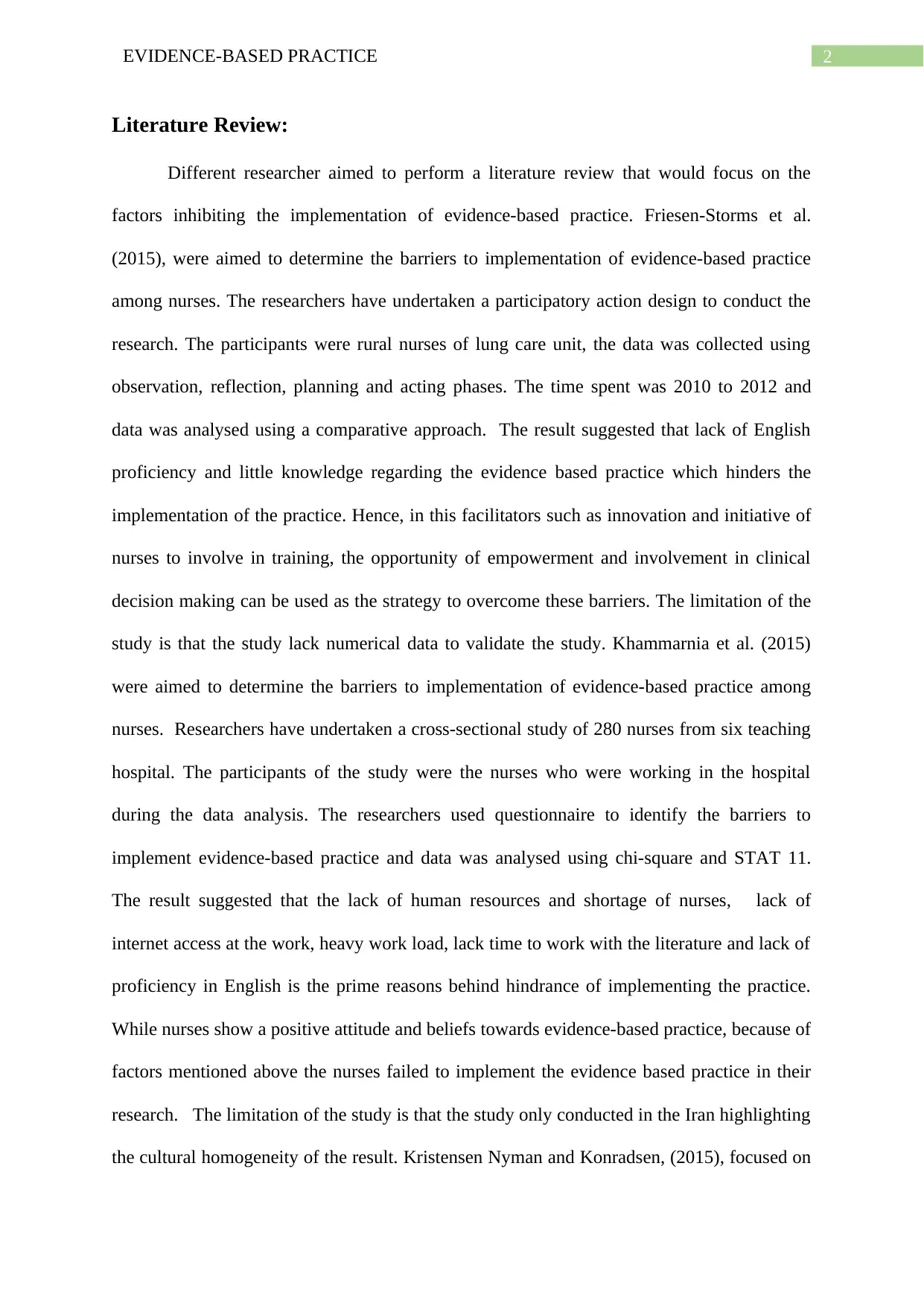
2EVIDENCE-BASED PRACTICE
Literature Review:
Different researcher aimed to perform a literature review that would focus on the
factors inhibiting the implementation of evidence-based practice. Friesen‐Storms et al.
(2015), were aimed to determine the barriers to implementation of evidence-based practice
among nurses. The researchers have undertaken a participatory action design to conduct the
research. The participants were rural nurses of lung care unit, the data was collected using
observation, reflection, planning and acting phases. The time spent was 2010 to 2012 and
data was analysed using a comparative approach. The result suggested that lack of English
proficiency and little knowledge regarding the evidence based practice which hinders the
implementation of the practice. Hence, in this facilitators such as innovation and initiative of
nurses to involve in training, the opportunity of empowerment and involvement in clinical
decision making can be used as the strategy to overcome these barriers. The limitation of the
study is that the study lack numerical data to validate the study. Khammarnia et al. (2015)
were aimed to determine the barriers to implementation of evidence-based practice among
nurses. Researchers have undertaken a cross-sectional study of 280 nurses from six teaching
hospital. The participants of the study were the nurses who were working in the hospital
during the data analysis. The researchers used questionnaire to identify the barriers to
implement evidence-based practice and data was analysed using chi-square and STAT 11.
The result suggested that the lack of human resources and shortage of nurses, lack of
internet access at the work, heavy work load, lack time to work with the literature and lack of
proficiency in English is the prime reasons behind hindrance of implementing the practice.
While nurses show a positive attitude and beliefs towards evidence-based practice, because of
factors mentioned above the nurses failed to implement the evidence based practice in their
research. The limitation of the study is that the study only conducted in the Iran highlighting
the cultural homogeneity of the result. Kristensen Nyman and Konradsen, (2015), focused on
Literature Review:
Different researcher aimed to perform a literature review that would focus on the
factors inhibiting the implementation of evidence-based practice. Friesen‐Storms et al.
(2015), were aimed to determine the barriers to implementation of evidence-based practice
among nurses. The researchers have undertaken a participatory action design to conduct the
research. The participants were rural nurses of lung care unit, the data was collected using
observation, reflection, planning and acting phases. The time spent was 2010 to 2012 and
data was analysed using a comparative approach. The result suggested that lack of English
proficiency and little knowledge regarding the evidence based practice which hinders the
implementation of the practice. Hence, in this facilitators such as innovation and initiative of
nurses to involve in training, the opportunity of empowerment and involvement in clinical
decision making can be used as the strategy to overcome these barriers. The limitation of the
study is that the study lack numerical data to validate the study. Khammarnia et al. (2015)
were aimed to determine the barriers to implementation of evidence-based practice among
nurses. Researchers have undertaken a cross-sectional study of 280 nurses from six teaching
hospital. The participants of the study were the nurses who were working in the hospital
during the data analysis. The researchers used questionnaire to identify the barriers to
implement evidence-based practice and data was analysed using chi-square and STAT 11.
The result suggested that the lack of human resources and shortage of nurses, lack of
internet access at the work, heavy work load, lack time to work with the literature and lack of
proficiency in English is the prime reasons behind hindrance of implementing the practice.
While nurses show a positive attitude and beliefs towards evidence-based practice, because of
factors mentioned above the nurses failed to implement the evidence based practice in their
research. The limitation of the study is that the study only conducted in the Iran highlighting
the cultural homogeneity of the result. Kristensen Nyman and Konradsen, (2015), focused on
⊘ This is a preview!⊘
Do you want full access?
Subscribe today to unlock all pages.

Trusted by 1+ million students worldwide
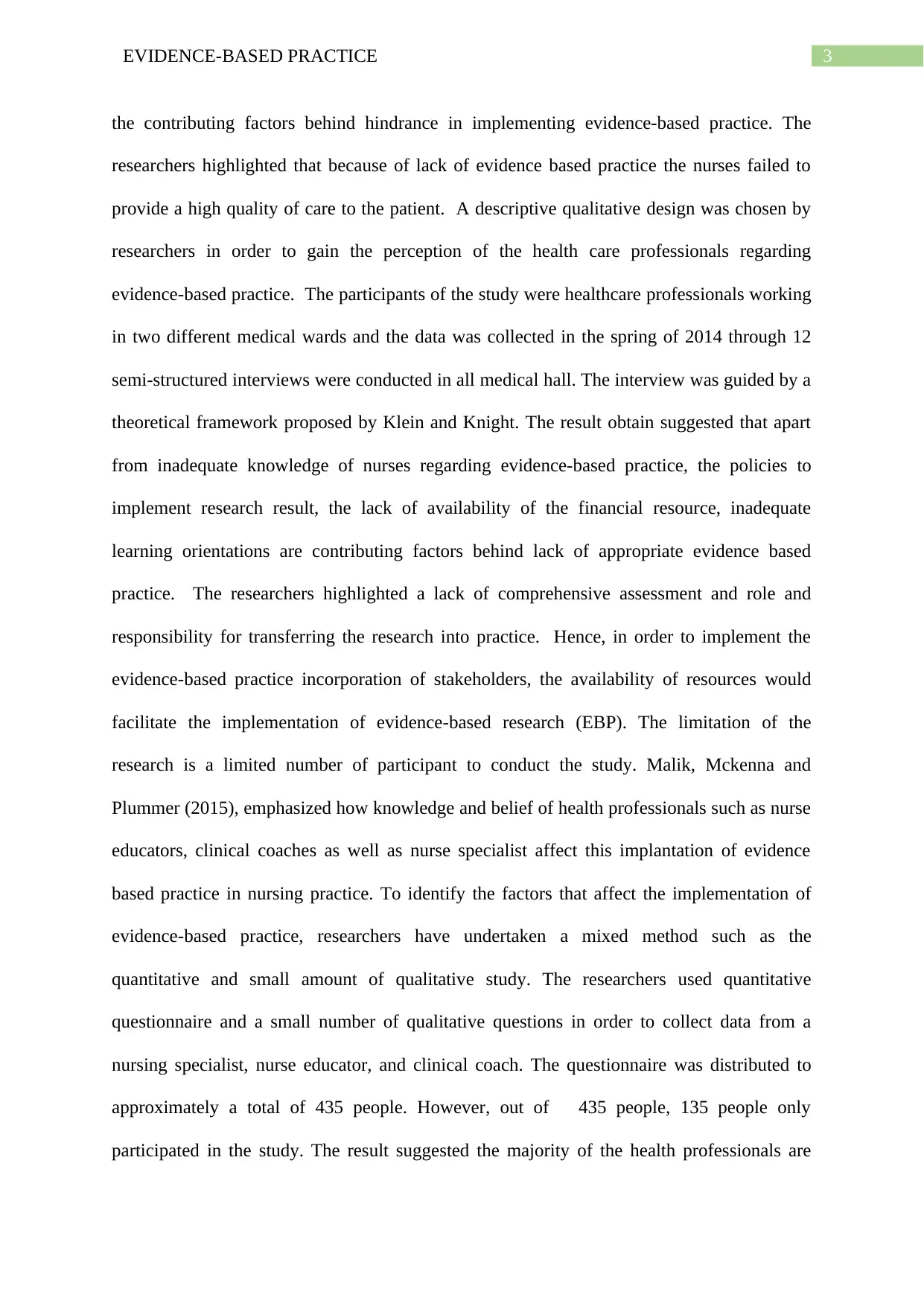
3EVIDENCE-BASED PRACTICE
the contributing factors behind hindrance in implementing evidence‐based practice. The
researchers highlighted that because of lack of evidence based practice the nurses failed to
provide a high quality of care to the patient. A descriptive qualitative design was chosen by
researchers in order to gain the perception of the health care professionals regarding
evidence-based practice. The participants of the study were healthcare professionals working
in two different medical wards and the data was collected in the spring of 2014 through 12
semi-structured interviews were conducted in all medical hall. The interview was guided by a
theoretical framework proposed by Klein and Knight. The result obtain suggested that apart
from inadequate knowledge of nurses regarding evidence-based practice, the policies to
implement research result, the lack of availability of the financial resource, inadequate
learning orientations are contributing factors behind lack of appropriate evidence based
practice. The researchers highlighted a lack of comprehensive assessment and role and
responsibility for transferring the research into practice. Hence, in order to implement the
evidence-based practice incorporation of stakeholders, the availability of resources would
facilitate the implementation of evidence-based research (EBP). The limitation of the
research is a limited number of participant to conduct the study. Malik, Mckenna and
Plummer (2015), emphasized how knowledge and belief of health professionals such as nurse
educators, clinical coaches as well as nurse specialist affect this implantation of evidence
based practice in nursing practice. To identify the factors that affect the implementation of
evidence-based practice, researchers have undertaken a mixed method such as the
quantitative and small amount of qualitative study. The researchers used quantitative
questionnaire and a small number of qualitative questions in order to collect data from a
nursing specialist, nurse educator, and clinical coach. The questionnaire was distributed to
approximately a total of 435 people. However, out of 435 people, 135 people only
participated in the study. The result suggested the majority of the health professionals are
the contributing factors behind hindrance in implementing evidence‐based practice. The
researchers highlighted that because of lack of evidence based practice the nurses failed to
provide a high quality of care to the patient. A descriptive qualitative design was chosen by
researchers in order to gain the perception of the health care professionals regarding
evidence-based practice. The participants of the study were healthcare professionals working
in two different medical wards and the data was collected in the spring of 2014 through 12
semi-structured interviews were conducted in all medical hall. The interview was guided by a
theoretical framework proposed by Klein and Knight. The result obtain suggested that apart
from inadequate knowledge of nurses regarding evidence-based practice, the policies to
implement research result, the lack of availability of the financial resource, inadequate
learning orientations are contributing factors behind lack of appropriate evidence based
practice. The researchers highlighted a lack of comprehensive assessment and role and
responsibility for transferring the research into practice. Hence, in order to implement the
evidence-based practice incorporation of stakeholders, the availability of resources would
facilitate the implementation of evidence-based research (EBP). The limitation of the
research is a limited number of participant to conduct the study. Malik, Mckenna and
Plummer (2015), emphasized how knowledge and belief of health professionals such as nurse
educators, clinical coaches as well as nurse specialist affect this implantation of evidence
based practice in nursing practice. To identify the factors that affect the implementation of
evidence-based practice, researchers have undertaken a mixed method such as the
quantitative and small amount of qualitative study. The researchers used quantitative
questionnaire and a small number of qualitative questions in order to collect data from a
nursing specialist, nurse educator, and clinical coach. The questionnaire was distributed to
approximately a total of 435 people. However, out of 435 people, 135 people only
participated in the study. The result suggested the majority of the health professionals are
Paraphrase This Document
Need a fresh take? Get an instant paraphrase of this document with our AI Paraphraser
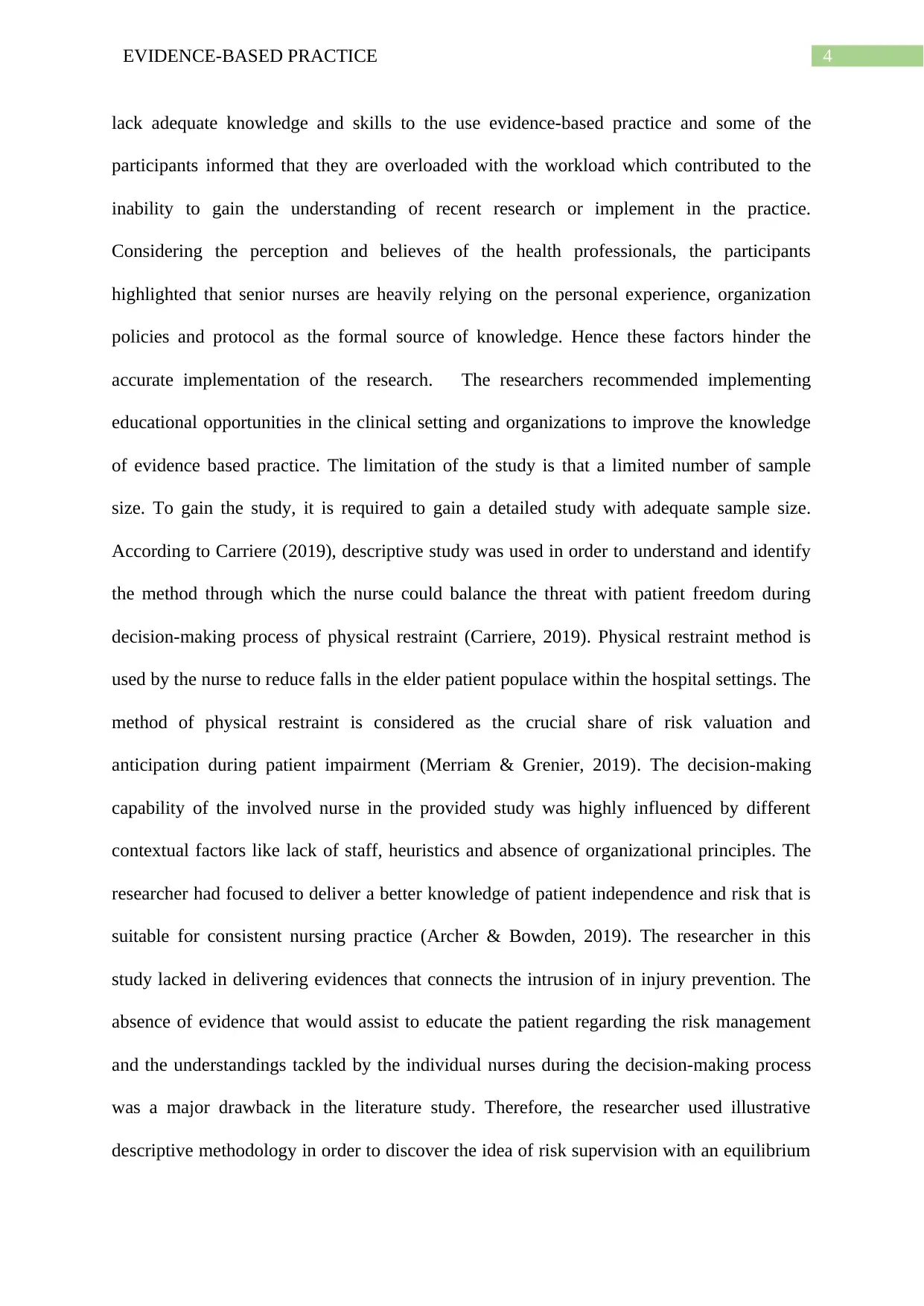
4EVIDENCE-BASED PRACTICE
lack adequate knowledge and skills to the use evidence-based practice and some of the
participants informed that they are overloaded with the workload which contributed to the
inability to gain the understanding of recent research or implement in the practice.
Considering the perception and believes of the health professionals, the participants
highlighted that senior nurses are heavily relying on the personal experience, organization
policies and protocol as the formal source of knowledge. Hence these factors hinder the
accurate implementation of the research. The researchers recommended implementing
educational opportunities in the clinical setting and organizations to improve the knowledge
of evidence based practice. The limitation of the study is that a limited number of sample
size. To gain the study, it is required to gain a detailed study with adequate sample size.
According to Carriere (2019), descriptive study was used in order to understand and identify
the method through which the nurse could balance the threat with patient freedom during
decision-making process of physical restraint (Carriere, 2019). Physical restraint method is
used by the nurse to reduce falls in the elder patient populace within the hospital settings. The
method of physical restraint is considered as the crucial share of risk valuation and
anticipation during patient impairment (Merriam & Grenier, 2019). The decision-making
capability of the involved nurse in the provided study was highly influenced by different
contextual factors like lack of staff, heuristics and absence of organizational principles. The
researcher had focused to deliver a better knowledge of patient independence and risk that is
suitable for consistent nursing practice (Archer & Bowden, 2019). The researcher in this
study lacked in delivering evidences that connects the intrusion of in injury prevention. The
absence of evidence that would assist to educate the patient regarding the risk management
and the understandings tackled by the individual nurses during the decision-making process
was a major drawback in the literature study. Therefore, the researcher used illustrative
descriptive methodology in order to discover the idea of risk supervision with an equilibrium
lack adequate knowledge and skills to the use evidence-based practice and some of the
participants informed that they are overloaded with the workload which contributed to the
inability to gain the understanding of recent research or implement in the practice.
Considering the perception and believes of the health professionals, the participants
highlighted that senior nurses are heavily relying on the personal experience, organization
policies and protocol as the formal source of knowledge. Hence these factors hinder the
accurate implementation of the research. The researchers recommended implementing
educational opportunities in the clinical setting and organizations to improve the knowledge
of evidence based practice. The limitation of the study is that a limited number of sample
size. To gain the study, it is required to gain a detailed study with adequate sample size.
According to Carriere (2019), descriptive study was used in order to understand and identify
the method through which the nurse could balance the threat with patient freedom during
decision-making process of physical restraint (Carriere, 2019). Physical restraint method is
used by the nurse to reduce falls in the elder patient populace within the hospital settings. The
method of physical restraint is considered as the crucial share of risk valuation and
anticipation during patient impairment (Merriam & Grenier, 2019). The decision-making
capability of the involved nurse in the provided study was highly influenced by different
contextual factors like lack of staff, heuristics and absence of organizational principles. The
researcher had focused to deliver a better knowledge of patient independence and risk that is
suitable for consistent nursing practice (Archer & Bowden, 2019). The researcher in this
study lacked in delivering evidences that connects the intrusion of in injury prevention. The
absence of evidence that would assist to educate the patient regarding the risk management
and the understandings tackled by the individual nurses during the decision-making process
was a major drawback in the literature study. Therefore, the researcher used illustrative
descriptive methodology in order to discover the idea of risk supervision with an equilibrium
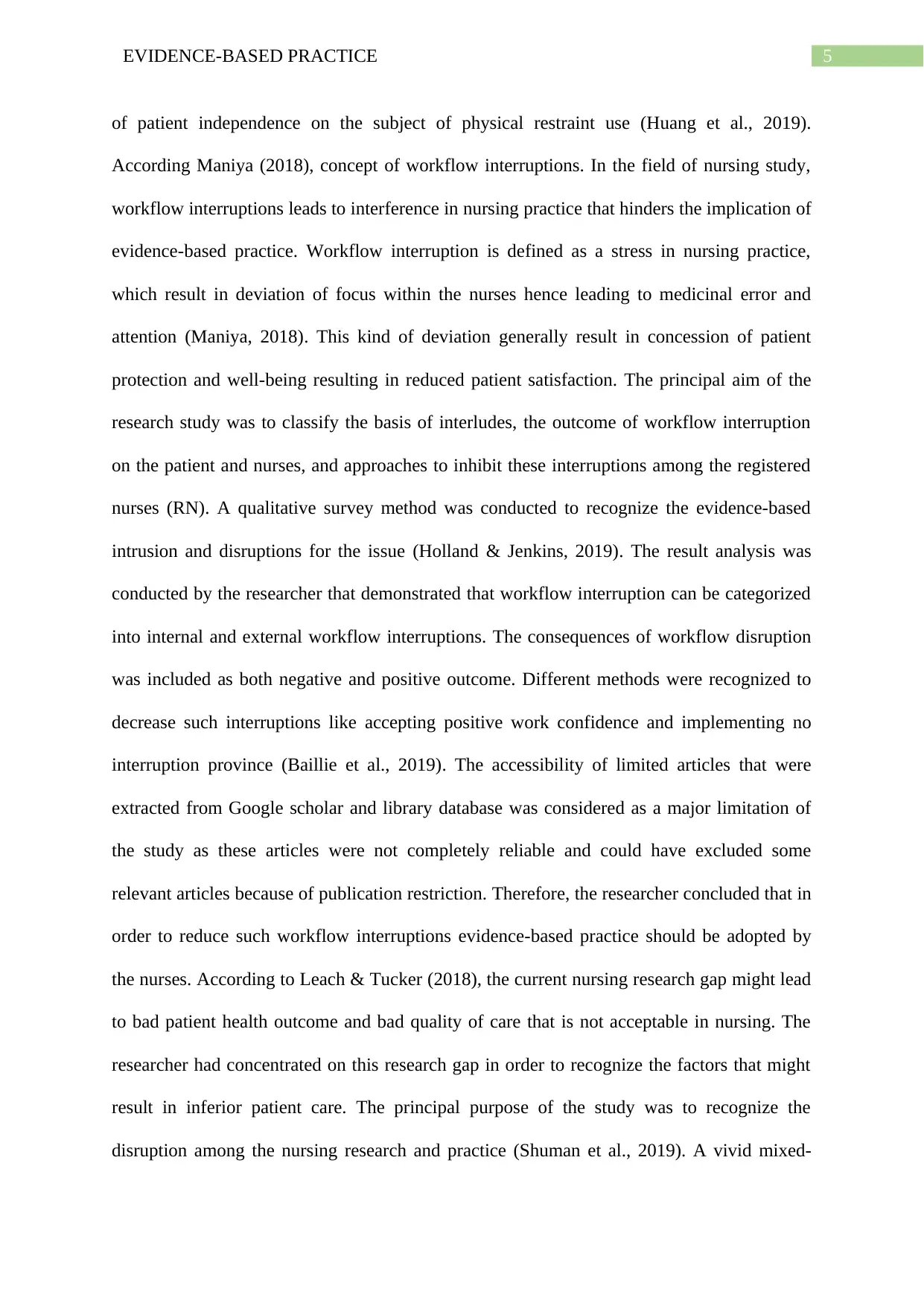
5EVIDENCE-BASED PRACTICE
of patient independence on the subject of physical restraint use (Huang et al., 2019).
According Maniya (2018), concept of workflow interruptions. In the field of nursing study,
workflow interruptions leads to interference in nursing practice that hinders the implication of
evidence-based practice. Workflow interruption is defined as a stress in nursing practice,
which result in deviation of focus within the nurses hence leading to medicinal error and
attention (Maniya, 2018). This kind of deviation generally result in concession of patient
protection and well-being resulting in reduced patient satisfaction. The principal aim of the
research study was to classify the basis of interludes, the outcome of workflow interruption
on the patient and nurses, and approaches to inhibit these interruptions among the registered
nurses (RN). A qualitative survey method was conducted to recognize the evidence-based
intrusion and disruptions for the issue (Holland & Jenkins, 2019). The result analysis was
conducted by the researcher that demonstrated that workflow interruption can be categorized
into internal and external workflow interruptions. The consequences of workflow disruption
was included as both negative and positive outcome. Different methods were recognized to
decrease such interruptions like accepting positive work confidence and implementing no
interruption province (Baillie et al., 2019). The accessibility of limited articles that were
extracted from Google scholar and library database was considered as a major limitation of
the study as these articles were not completely reliable and could have excluded some
relevant articles because of publication restriction. Therefore, the researcher concluded that in
order to reduce such workflow interruptions evidence-based practice should be adopted by
the nurses. According to Leach & Tucker (2018), the current nursing research gap might lead
to bad patient health outcome and bad quality of care that is not acceptable in nursing. The
researcher had concentrated on this research gap in order to recognize the factors that might
result in inferior patient care. The principal purpose of the study was to recognize the
disruption among the nursing research and practice (Shuman et al., 2019). A vivid mixed-
of patient independence on the subject of physical restraint use (Huang et al., 2019).
According Maniya (2018), concept of workflow interruptions. In the field of nursing study,
workflow interruptions leads to interference in nursing practice that hinders the implication of
evidence-based practice. Workflow interruption is defined as a stress in nursing practice,
which result in deviation of focus within the nurses hence leading to medicinal error and
attention (Maniya, 2018). This kind of deviation generally result in concession of patient
protection and well-being resulting in reduced patient satisfaction. The principal aim of the
research study was to classify the basis of interludes, the outcome of workflow interruption
on the patient and nurses, and approaches to inhibit these interruptions among the registered
nurses (RN). A qualitative survey method was conducted to recognize the evidence-based
intrusion and disruptions for the issue (Holland & Jenkins, 2019). The result analysis was
conducted by the researcher that demonstrated that workflow interruption can be categorized
into internal and external workflow interruptions. The consequences of workflow disruption
was included as both negative and positive outcome. Different methods were recognized to
decrease such interruptions like accepting positive work confidence and implementing no
interruption province (Baillie et al., 2019). The accessibility of limited articles that were
extracted from Google scholar and library database was considered as a major limitation of
the study as these articles were not completely reliable and could have excluded some
relevant articles because of publication restriction. Therefore, the researcher concluded that in
order to reduce such workflow interruptions evidence-based practice should be adopted by
the nurses. According to Leach & Tucker (2018), the current nursing research gap might lead
to bad patient health outcome and bad quality of care that is not acceptable in nursing. The
researcher had concentrated on this research gap in order to recognize the factors that might
result in inferior patient care. The principal purpose of the study was to recognize the
disruption among the nursing research and practice (Shuman et al., 2019). A vivid mixed-
⊘ This is a preview!⊘
Do you want full access?
Subscribe today to unlock all pages.

Trusted by 1+ million students worldwide
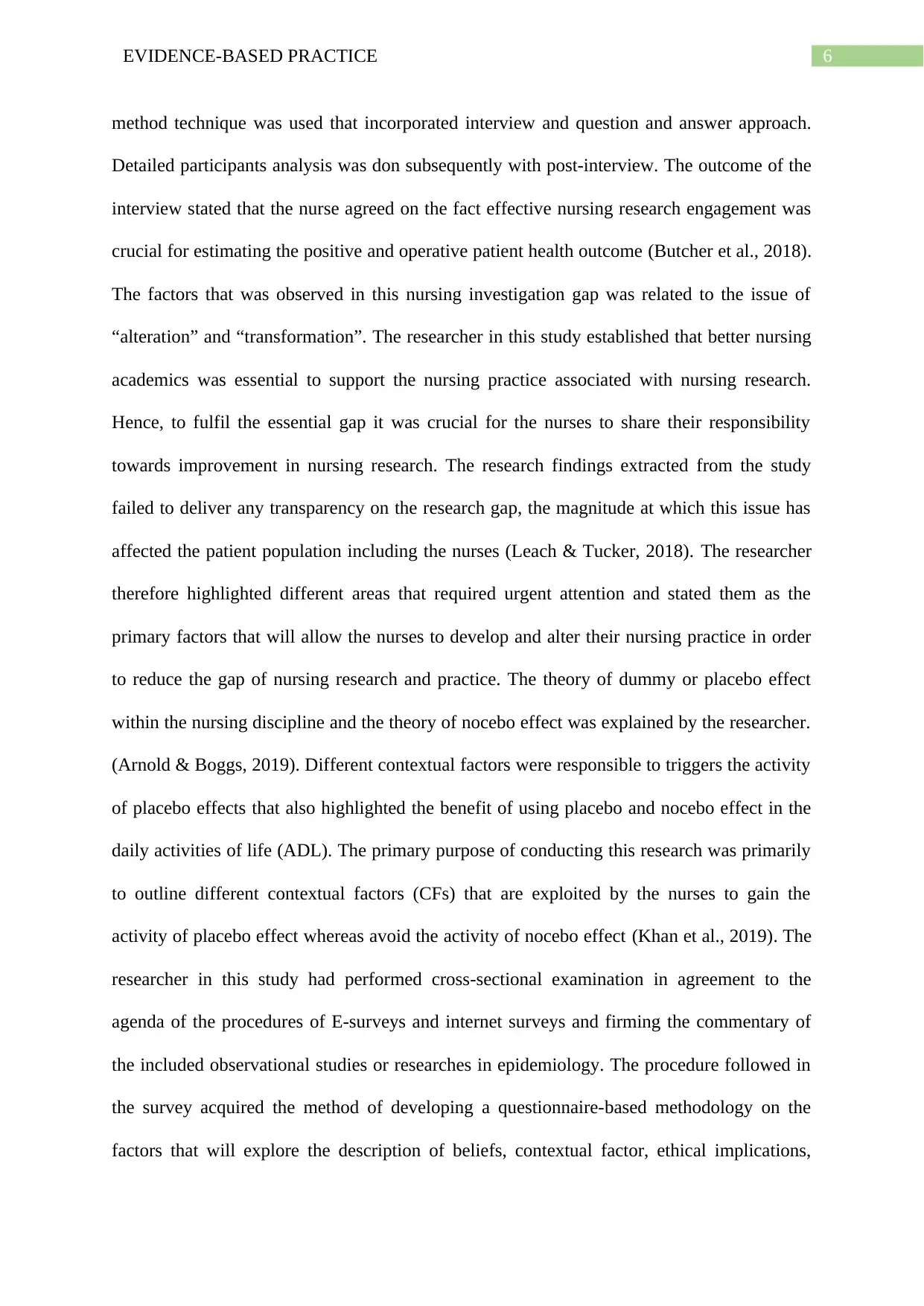
6EVIDENCE-BASED PRACTICE
method technique was used that incorporated interview and question and answer approach.
Detailed participants analysis was don subsequently with post-interview. The outcome of the
interview stated that the nurse agreed on the fact effective nursing research engagement was
crucial for estimating the positive and operative patient health outcome (Butcher et al., 2018).
The factors that was observed in this nursing investigation gap was related to the issue of
“alteration” and “transformation”. The researcher in this study established that better nursing
academics was essential to support the nursing practice associated with nursing research.
Hence, to fulfil the essential gap it was crucial for the nurses to share their responsibility
towards improvement in nursing research. The research findings extracted from the study
failed to deliver any transparency on the research gap, the magnitude at which this issue has
affected the patient population including the nurses (Leach & Tucker, 2018). The researcher
therefore highlighted different areas that required urgent attention and stated them as the
primary factors that will allow the nurses to develop and alter their nursing practice in order
to reduce the gap of nursing research and practice. The theory of dummy or placebo effect
within the nursing discipline and the theory of nocebo effect was explained by the researcher.
(Arnold & Boggs, 2019). Different contextual factors were responsible to triggers the activity
of placebo effects that also highlighted the benefit of using placebo and nocebo effect in the
daily activities of life (ADL). The primary purpose of conducting this research was primarily
to outline different contextual factors (CFs) that are exploited by the nurses to gain the
activity of placebo effect whereas avoid the activity of nocebo effect (Khan et al., 2019). The
researcher in this study had performed cross-sectional examination in agreement to the
agenda of the procedures of E-surveys and internet surveys and firming the commentary of
the included observational studies or researches in epidemiology. The procedure followed in
the survey acquired the method of developing a questionnaire-based methodology on the
factors that will explore the description of beliefs, contextual factor, ethical implications,
method technique was used that incorporated interview and question and answer approach.
Detailed participants analysis was don subsequently with post-interview. The outcome of the
interview stated that the nurse agreed on the fact effective nursing research engagement was
crucial for estimating the positive and operative patient health outcome (Butcher et al., 2018).
The factors that was observed in this nursing investigation gap was related to the issue of
“alteration” and “transformation”. The researcher in this study established that better nursing
academics was essential to support the nursing practice associated with nursing research.
Hence, to fulfil the essential gap it was crucial for the nurses to share their responsibility
towards improvement in nursing research. The research findings extracted from the study
failed to deliver any transparency on the research gap, the magnitude at which this issue has
affected the patient population including the nurses (Leach & Tucker, 2018). The researcher
therefore highlighted different areas that required urgent attention and stated them as the
primary factors that will allow the nurses to develop and alter their nursing practice in order
to reduce the gap of nursing research and practice. The theory of dummy or placebo effect
within the nursing discipline and the theory of nocebo effect was explained by the researcher.
(Arnold & Boggs, 2019). Different contextual factors were responsible to triggers the activity
of placebo effects that also highlighted the benefit of using placebo and nocebo effect in the
daily activities of life (ADL). The primary purpose of conducting this research was primarily
to outline different contextual factors (CFs) that are exploited by the nurses to gain the
activity of placebo effect whereas avoid the activity of nocebo effect (Khan et al., 2019). The
researcher in this study had performed cross-sectional examination in agreement to the
agenda of the procedures of E-surveys and internet surveys and firming the commentary of
the included observational studies or researches in epidemiology. The procedure followed in
the survey acquired the method of developing a questionnaire-based methodology on the
factors that will explore the description of beliefs, contextual factor, ethical implications,
Paraphrase This Document
Need a fresh take? Get an instant paraphrase of this document with our AI Paraphraser
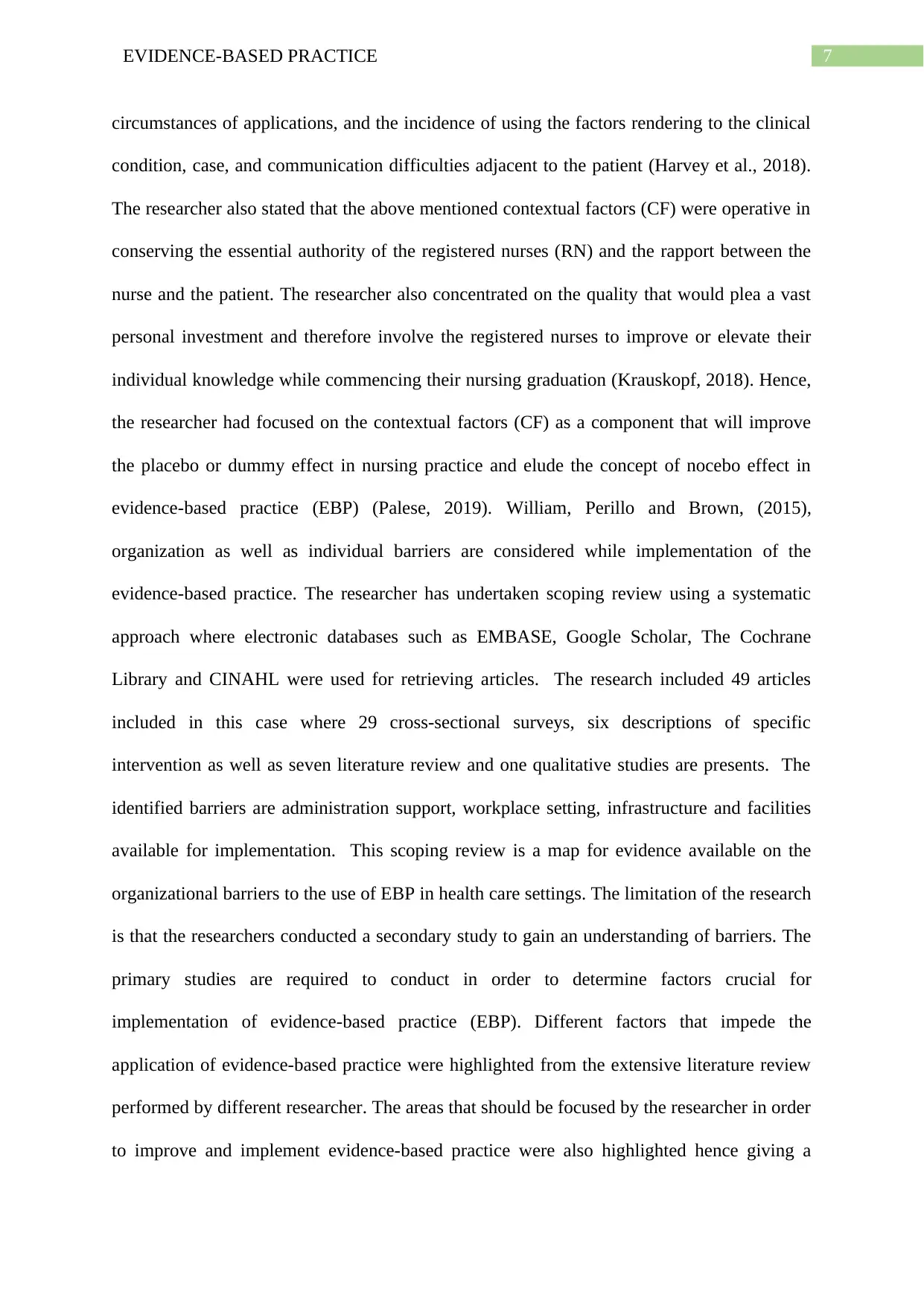
7EVIDENCE-BASED PRACTICE
circumstances of applications, and the incidence of using the factors rendering to the clinical
condition, case, and communication difficulties adjacent to the patient (Harvey et al., 2018).
The researcher also stated that the above mentioned contextual factors (CF) were operative in
conserving the essential authority of the registered nurses (RN) and the rapport between the
nurse and the patient. The researcher also concentrated on the quality that would plea a vast
personal investment and therefore involve the registered nurses to improve or elevate their
individual knowledge while commencing their nursing graduation (Krauskopf, 2018). Hence,
the researcher had focused on the contextual factors (CF) as a component that will improve
the placebo or dummy effect in nursing practice and elude the concept of nocebo effect in
evidence-based practice (EBP) (Palese, 2019). William, Perillo and Brown, (2015),
organization as well as individual barriers are considered while implementation of the
evidence-based practice. The researcher has undertaken scoping review using a systematic
approach where electronic databases such as EMBASE, Google Scholar, The Cochrane
Library and CINAHL were used for retrieving articles. The research included 49 articles
included in this case where 29 cross-sectional surveys, six descriptions of specific
intervention as well as seven literature review and one qualitative studies are presents. The
identified barriers are administration support, workplace setting, infrastructure and facilities
available for implementation. This scoping review is a map for evidence available on the
organizational barriers to the use of EBP in health care settings. The limitation of the research
is that the researchers conducted a secondary study to gain an understanding of barriers. The
primary studies are required to conduct in order to determine factors crucial for
implementation of evidence-based practice (EBP). Different factors that impede the
application of evidence-based practice were highlighted from the extensive literature review
performed by different researcher. The areas that should be focused by the researcher in order
to improve and implement evidence-based practice were also highlighted hence giving a
circumstances of applications, and the incidence of using the factors rendering to the clinical
condition, case, and communication difficulties adjacent to the patient (Harvey et al., 2018).
The researcher also stated that the above mentioned contextual factors (CF) were operative in
conserving the essential authority of the registered nurses (RN) and the rapport between the
nurse and the patient. The researcher also concentrated on the quality that would plea a vast
personal investment and therefore involve the registered nurses to improve or elevate their
individual knowledge while commencing their nursing graduation (Krauskopf, 2018). Hence,
the researcher had focused on the contextual factors (CF) as a component that will improve
the placebo or dummy effect in nursing practice and elude the concept of nocebo effect in
evidence-based practice (EBP) (Palese, 2019). William, Perillo and Brown, (2015),
organization as well as individual barriers are considered while implementation of the
evidence-based practice. The researcher has undertaken scoping review using a systematic
approach where electronic databases such as EMBASE, Google Scholar, The Cochrane
Library and CINAHL were used for retrieving articles. The research included 49 articles
included in this case where 29 cross-sectional surveys, six descriptions of specific
intervention as well as seven literature review and one qualitative studies are presents. The
identified barriers are administration support, workplace setting, infrastructure and facilities
available for implementation. This scoping review is a map for evidence available on the
organizational barriers to the use of EBP in health care settings. The limitation of the research
is that the researchers conducted a secondary study to gain an understanding of barriers. The
primary studies are required to conduct in order to determine factors crucial for
implementation of evidence-based practice (EBP). Different factors that impede the
application of evidence-based practice were highlighted from the extensive literature review
performed by different researcher. The areas that should be focused by the researcher in order
to improve and implement evidence-based practice were also highlighted hence giving a
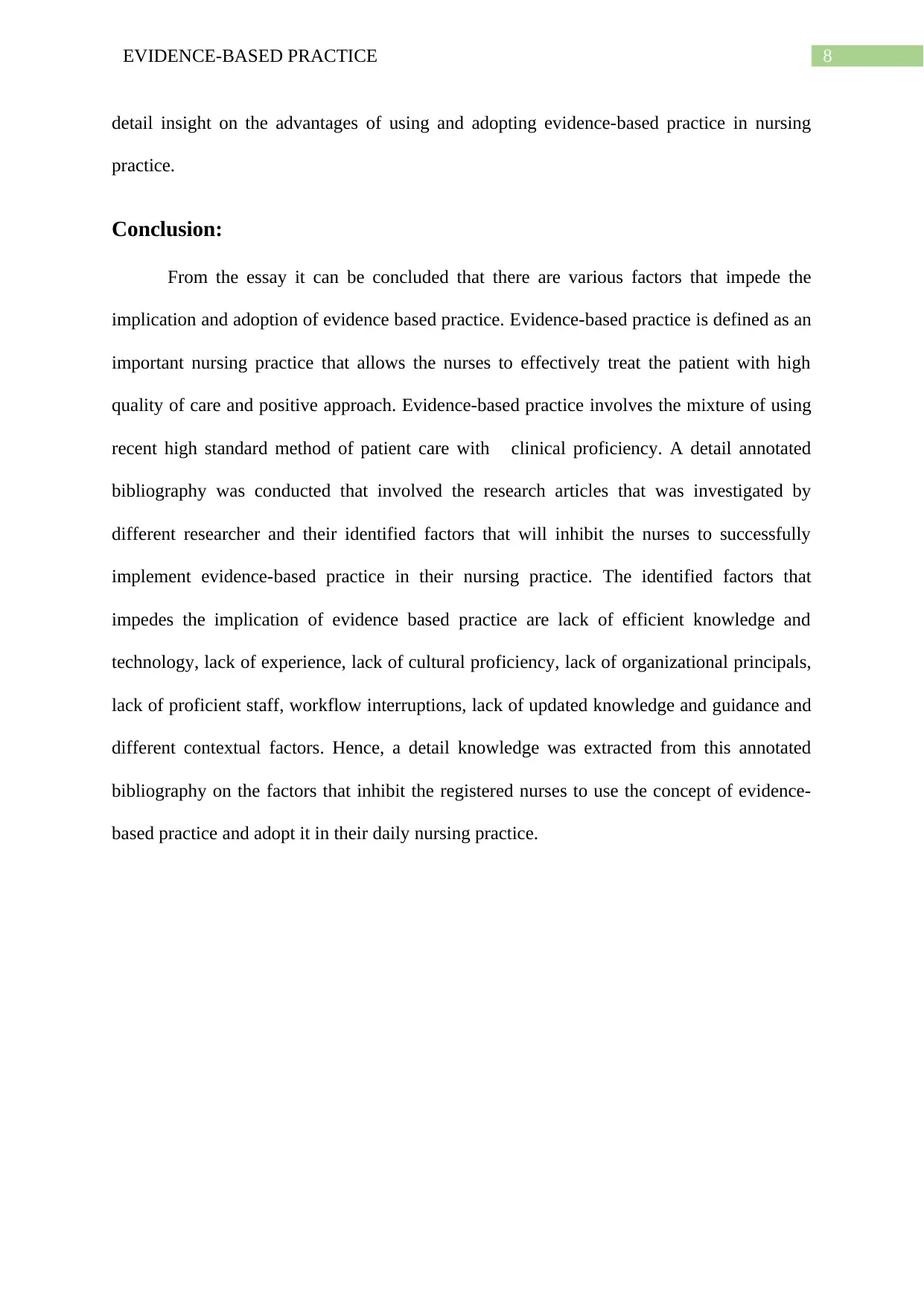
8EVIDENCE-BASED PRACTICE
detail insight on the advantages of using and adopting evidence-based practice in nursing
practice.
Conclusion:
From the essay it can be concluded that there are various factors that impede the
implication and adoption of evidence based practice. Evidence-based practice is defined as an
important nursing practice that allows the nurses to effectively treat the patient with high
quality of care and positive approach. Evidence-based practice involves the mixture of using
recent high standard method of patient care with clinical proficiency. A detail annotated
bibliography was conducted that involved the research articles that was investigated by
different researcher and their identified factors that will inhibit the nurses to successfully
implement evidence-based practice in their nursing practice. The identified factors that
impedes the implication of evidence based practice are lack of efficient knowledge and
technology, lack of experience, lack of cultural proficiency, lack of organizational principals,
lack of proficient staff, workflow interruptions, lack of updated knowledge and guidance and
different contextual factors. Hence, a detail knowledge was extracted from this annotated
bibliography on the factors that inhibit the registered nurses to use the concept of evidence-
based practice and adopt it in their daily nursing practice.
detail insight on the advantages of using and adopting evidence-based practice in nursing
practice.
Conclusion:
From the essay it can be concluded that there are various factors that impede the
implication and adoption of evidence based practice. Evidence-based practice is defined as an
important nursing practice that allows the nurses to effectively treat the patient with high
quality of care and positive approach. Evidence-based practice involves the mixture of using
recent high standard method of patient care with clinical proficiency. A detail annotated
bibliography was conducted that involved the research articles that was investigated by
different researcher and their identified factors that will inhibit the nurses to successfully
implement evidence-based practice in their nursing practice. The identified factors that
impedes the implication of evidence based practice are lack of efficient knowledge and
technology, lack of experience, lack of cultural proficiency, lack of organizational principals,
lack of proficient staff, workflow interruptions, lack of updated knowledge and guidance and
different contextual factors. Hence, a detail knowledge was extracted from this annotated
bibliography on the factors that inhibit the registered nurses to use the concept of evidence-
based practice and adopt it in their daily nursing practice.
⊘ This is a preview!⊘
Do you want full access?
Subscribe today to unlock all pages.

Trusted by 1+ million students worldwide
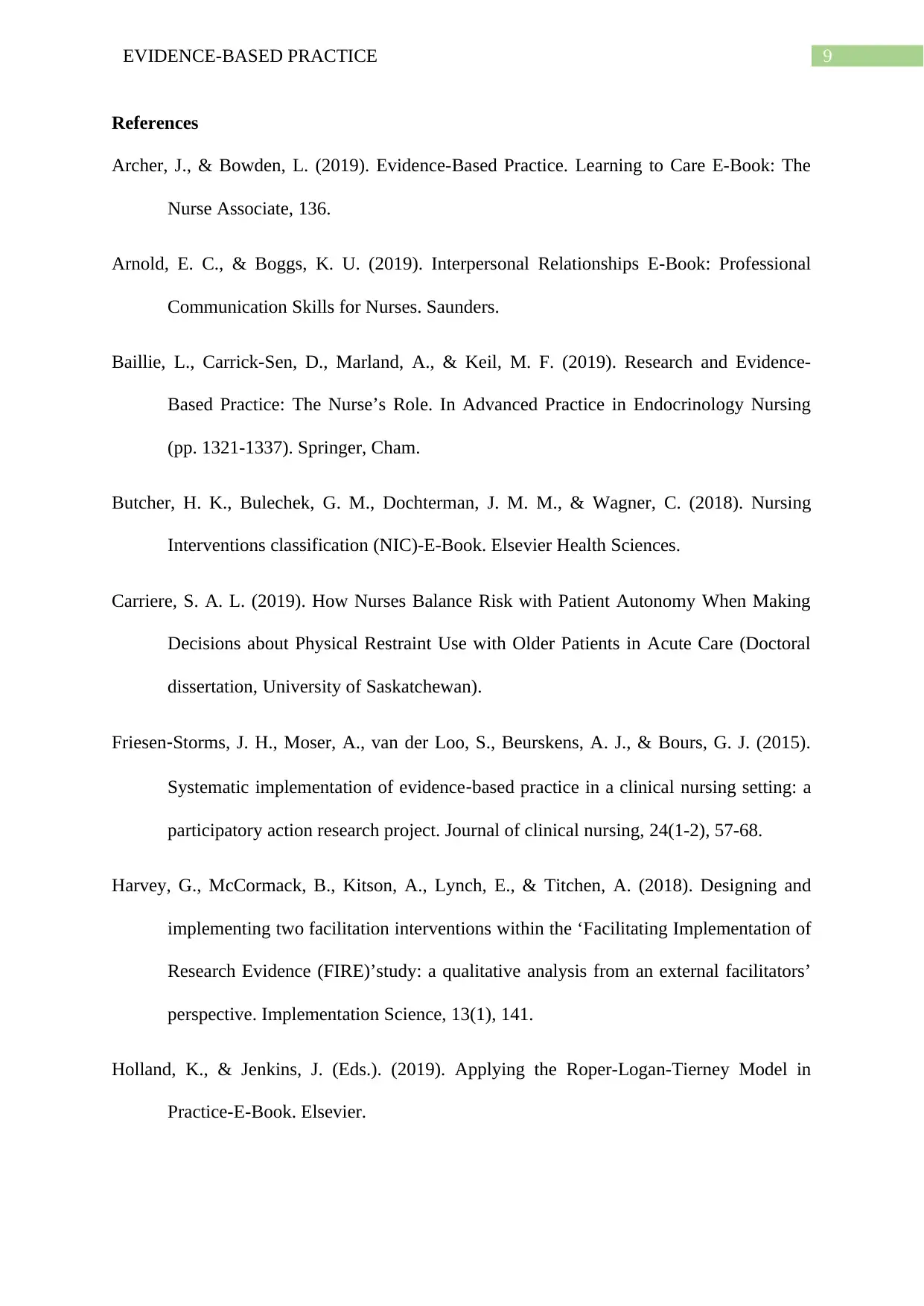
9EVIDENCE-BASED PRACTICE
References
Archer, J., & Bowden, L. (2019). Evidence-Based Practice. Learning to Care E-Book: The
Nurse Associate, 136.
Arnold, E. C., & Boggs, K. U. (2019). Interpersonal Relationships E-Book: Professional
Communication Skills for Nurses. Saunders.
Baillie, L., Carrick-Sen, D., Marland, A., & Keil, M. F. (2019). Research and Evidence-
Based Practice: The Nurse’s Role. In Advanced Practice in Endocrinology Nursing
(pp. 1321-1337). Springer, Cham.
Butcher, H. K., Bulechek, G. M., Dochterman, J. M. M., & Wagner, C. (2018). Nursing
Interventions classification (NIC)-E-Book. Elsevier Health Sciences.
Carriere, S. A. L. (2019). How Nurses Balance Risk with Patient Autonomy When Making
Decisions about Physical Restraint Use with Older Patients in Acute Care (Doctoral
dissertation, University of Saskatchewan).
Friesen‐Storms, J. H., Moser, A., van der Loo, S., Beurskens, A. J., & Bours, G. J. (2015).
Systematic implementation of evidence‐based practice in a clinical nursing setting: a
participatory action research project. Journal of clinical nursing, 24(1-2), 57-68.
Harvey, G., McCormack, B., Kitson, A., Lynch, E., & Titchen, A. (2018). Designing and
implementing two facilitation interventions within the ‘Facilitating Implementation of
Research Evidence (FIRE)’study: a qualitative analysis from an external facilitators’
perspective. Implementation Science, 13(1), 141.
Holland, K., & Jenkins, J. (Eds.). (2019). Applying the Roper-Logan-Tierney Model in
Practice-E-Book. Elsevier.
References
Archer, J., & Bowden, L. (2019). Evidence-Based Practice. Learning to Care E-Book: The
Nurse Associate, 136.
Arnold, E. C., & Boggs, K. U. (2019). Interpersonal Relationships E-Book: Professional
Communication Skills for Nurses. Saunders.
Baillie, L., Carrick-Sen, D., Marland, A., & Keil, M. F. (2019). Research and Evidence-
Based Practice: The Nurse’s Role. In Advanced Practice in Endocrinology Nursing
(pp. 1321-1337). Springer, Cham.
Butcher, H. K., Bulechek, G. M., Dochterman, J. M. M., & Wagner, C. (2018). Nursing
Interventions classification (NIC)-E-Book. Elsevier Health Sciences.
Carriere, S. A. L. (2019). How Nurses Balance Risk with Patient Autonomy When Making
Decisions about Physical Restraint Use with Older Patients in Acute Care (Doctoral
dissertation, University of Saskatchewan).
Friesen‐Storms, J. H., Moser, A., van der Loo, S., Beurskens, A. J., & Bours, G. J. (2015).
Systematic implementation of evidence‐based practice in a clinical nursing setting: a
participatory action research project. Journal of clinical nursing, 24(1-2), 57-68.
Harvey, G., McCormack, B., Kitson, A., Lynch, E., & Titchen, A. (2018). Designing and
implementing two facilitation interventions within the ‘Facilitating Implementation of
Research Evidence (FIRE)’study: a qualitative analysis from an external facilitators’
perspective. Implementation Science, 13(1), 141.
Holland, K., & Jenkins, J. (Eds.). (2019). Applying the Roper-Logan-Tierney Model in
Practice-E-Book. Elsevier.
Paraphrase This Document
Need a fresh take? Get an instant paraphrase of this document with our AI Paraphraser
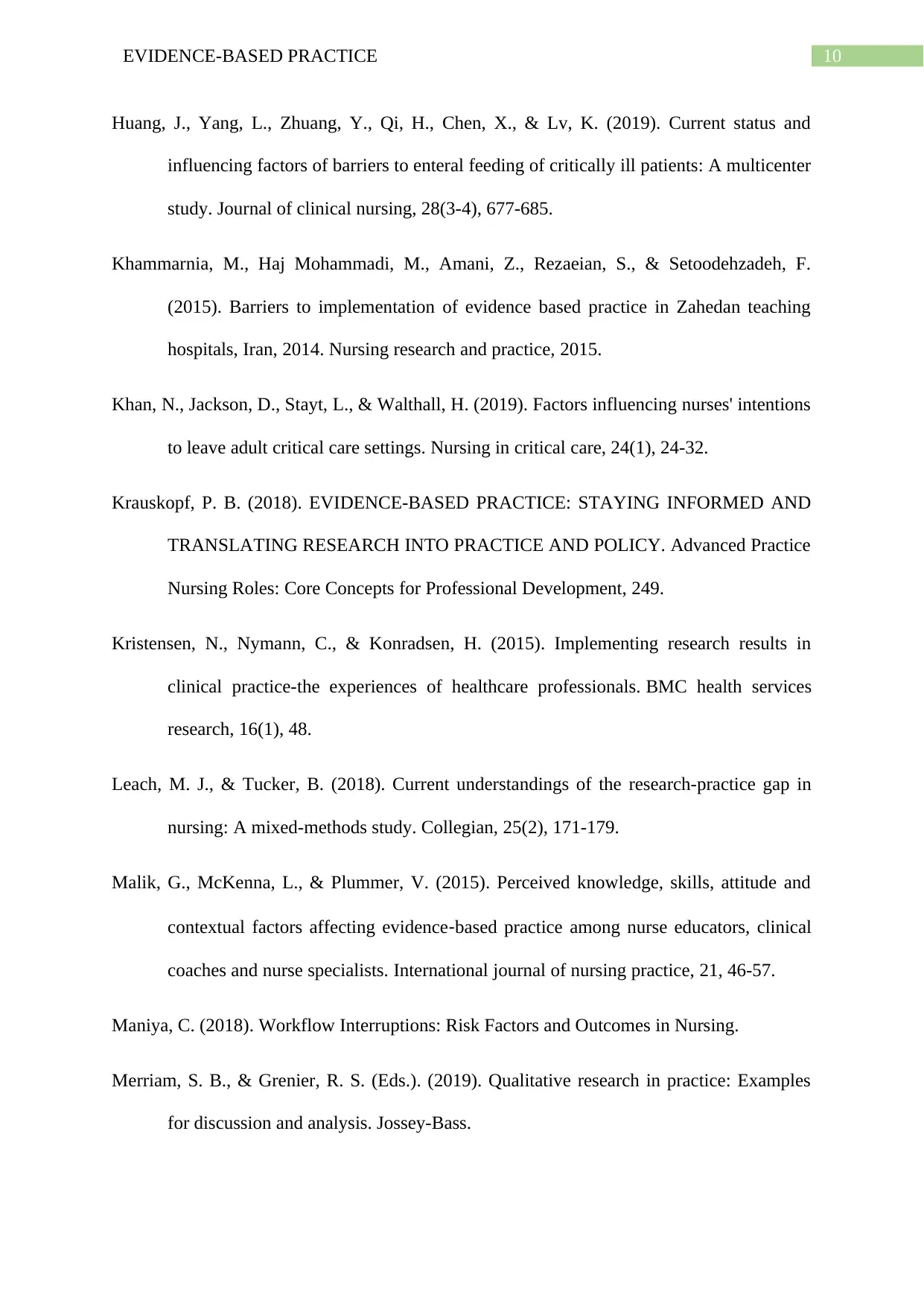
10EVIDENCE-BASED PRACTICE
Huang, J., Yang, L., Zhuang, Y., Qi, H., Chen, X., & Lv, K. (2019). Current status and
influencing factors of barriers to enteral feeding of critically ill patients: A multicenter
study. Journal of clinical nursing, 28(3-4), 677-685.
Khammarnia, M., Haj Mohammadi, M., Amani, Z., Rezaeian, S., & Setoodehzadeh, F.
(2015). Barriers to implementation of evidence based practice in Zahedan teaching
hospitals, Iran, 2014. Nursing research and practice, 2015.
Khan, N., Jackson, D., Stayt, L., & Walthall, H. (2019). Factors influencing nurses' intentions
to leave adult critical care settings. Nursing in critical care, 24(1), 24-32.
Krauskopf, P. B. (2018). EVIDENCE-BASED PRACTICE: STAYING INFORMED AND
TRANSLATING RESEARCH INTO PRACTICE AND POLICY. Advanced Practice
Nursing Roles: Core Concepts for Professional Development, 249.
Kristensen, N., Nymann, C., & Konradsen, H. (2015). Implementing research results in
clinical practice-the experiences of healthcare professionals. BMC health services
research, 16(1), 48.
Leach, M. J., & Tucker, B. (2018). Current understandings of the research-practice gap in
nursing: A mixed-methods study. Collegian, 25(2), 171-179.
Malik, G., McKenna, L., & Plummer, V. (2015). Perceived knowledge, skills, attitude and
contextual factors affecting evidence‐based practice among nurse educators, clinical
coaches and nurse specialists. International journal of nursing practice, 21, 46-57.
Maniya, C. (2018). Workflow Interruptions: Risk Factors and Outcomes in Nursing.
Merriam, S. B., & Grenier, R. S. (Eds.). (2019). Qualitative research in practice: Examples
for discussion and analysis. Jossey-Bass.
Huang, J., Yang, L., Zhuang, Y., Qi, H., Chen, X., & Lv, K. (2019). Current status and
influencing factors of barriers to enteral feeding of critically ill patients: A multicenter
study. Journal of clinical nursing, 28(3-4), 677-685.
Khammarnia, M., Haj Mohammadi, M., Amani, Z., Rezaeian, S., & Setoodehzadeh, F.
(2015). Barriers to implementation of evidence based practice in Zahedan teaching
hospitals, Iran, 2014. Nursing research and practice, 2015.
Khan, N., Jackson, D., Stayt, L., & Walthall, H. (2019). Factors influencing nurses' intentions
to leave adult critical care settings. Nursing in critical care, 24(1), 24-32.
Krauskopf, P. B. (2018). EVIDENCE-BASED PRACTICE: STAYING INFORMED AND
TRANSLATING RESEARCH INTO PRACTICE AND POLICY. Advanced Practice
Nursing Roles: Core Concepts for Professional Development, 249.
Kristensen, N., Nymann, C., & Konradsen, H. (2015). Implementing research results in
clinical practice-the experiences of healthcare professionals. BMC health services
research, 16(1), 48.
Leach, M. J., & Tucker, B. (2018). Current understandings of the research-practice gap in
nursing: A mixed-methods study. Collegian, 25(2), 171-179.
Malik, G., McKenna, L., & Plummer, V. (2015). Perceived knowledge, skills, attitude and
contextual factors affecting evidence‐based practice among nurse educators, clinical
coaches and nurse specialists. International journal of nursing practice, 21, 46-57.
Maniya, C. (2018). Workflow Interruptions: Risk Factors and Outcomes in Nursing.
Merriam, S. B., & Grenier, R. S. (Eds.). (2019). Qualitative research in practice: Examples
for discussion and analysis. Jossey-Bass.
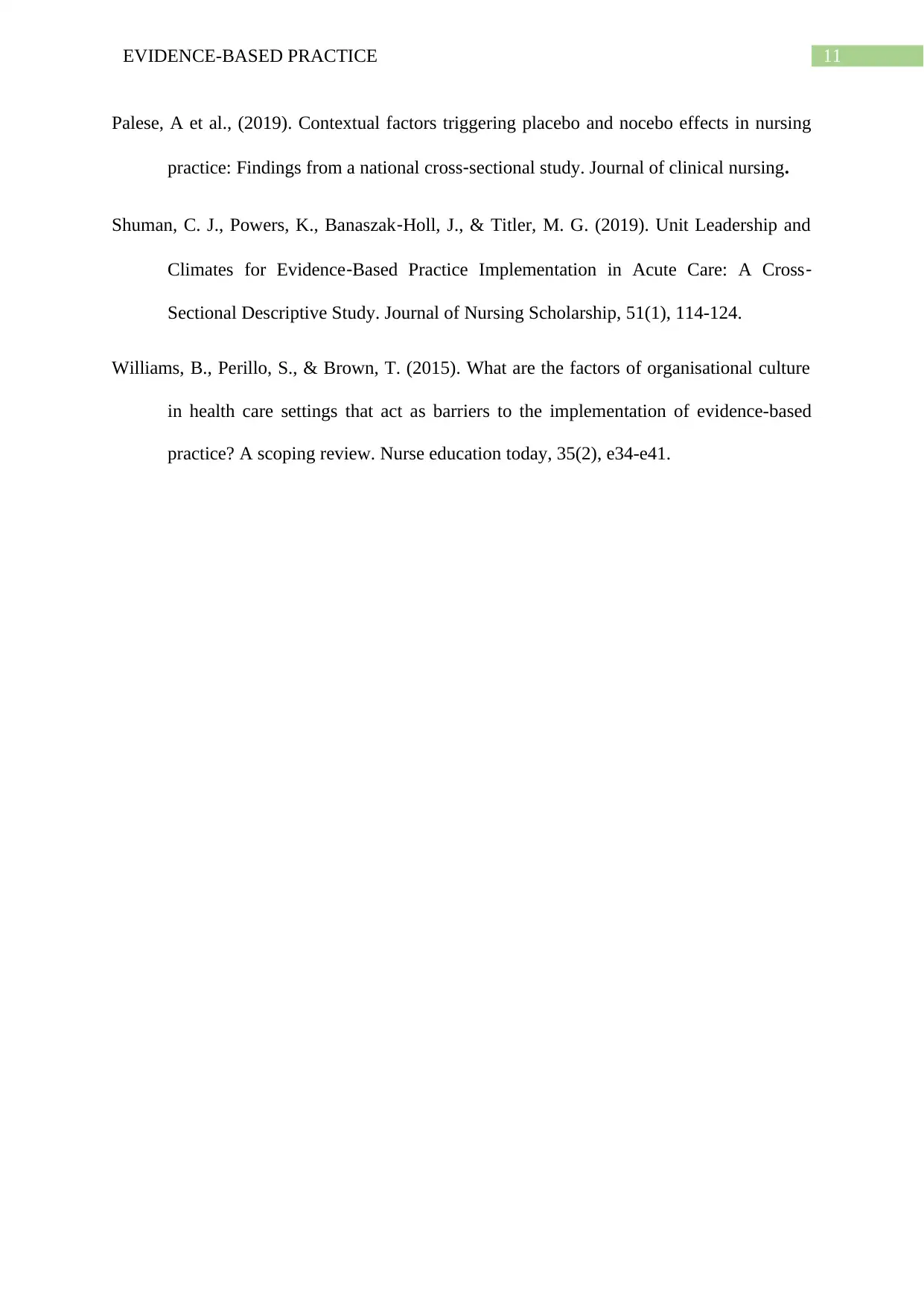
11EVIDENCE-BASED PRACTICE
Palese, A et al., (2019). Contextual factors triggering placebo and nocebo effects in nursing
practice: Findings from a national cross‐sectional study. Journal of clinical nursing.
Shuman, C. J., Powers, K., Banaszak‐Holl, J., & Titler, M. G. (2019). Unit Leadership and
Climates for Evidence‐Based Practice Implementation in Acute Care: A Cross‐
Sectional Descriptive Study. Journal of Nursing Scholarship, 51(1), 114-124.
Williams, B., Perillo, S., & Brown, T. (2015). What are the factors of organisational culture
in health care settings that act as barriers to the implementation of evidence-based
practice? A scoping review. Nurse education today, 35(2), e34-e41.
Palese, A et al., (2019). Contextual factors triggering placebo and nocebo effects in nursing
practice: Findings from a national cross‐sectional study. Journal of clinical nursing.
Shuman, C. J., Powers, K., Banaszak‐Holl, J., & Titler, M. G. (2019). Unit Leadership and
Climates for Evidence‐Based Practice Implementation in Acute Care: A Cross‐
Sectional Descriptive Study. Journal of Nursing Scholarship, 51(1), 114-124.
Williams, B., Perillo, S., & Brown, T. (2015). What are the factors of organisational culture
in health care settings that act as barriers to the implementation of evidence-based
practice? A scoping review. Nurse education today, 35(2), e34-e41.
⊘ This is a preview!⊘
Do you want full access?
Subscribe today to unlock all pages.

Trusted by 1+ million students worldwide
1 out of 12
Related Documents
Your All-in-One AI-Powered Toolkit for Academic Success.
+13062052269
info@desklib.com
Available 24*7 on WhatsApp / Email
![[object Object]](/_next/static/media/star-bottom.7253800d.svg)
Unlock your academic potential
Copyright © 2020–2026 A2Z Services. All Rights Reserved. Developed and managed by ZUCOL.





